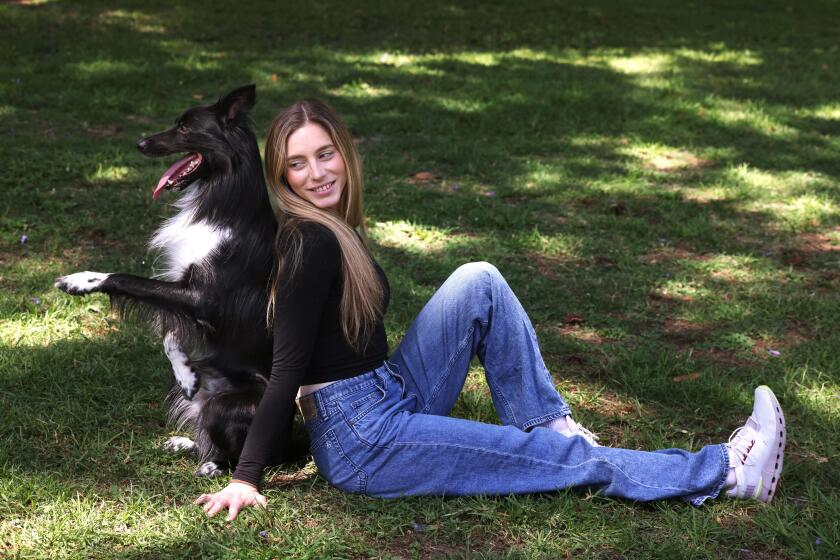Review: Vital issues raised at a meeting of ‘Top Girls’
The Antaeus Company’s production of Caryl Churchill’s “Top Girls” brings us refreshingly back to the basics of great theater: a sharply intelligent, poetically daring play; a company of actors dedicated to serving both their characters and an author’s unique dramatic style; and a director, unencumbered by lavish resources, able to concentrate our attention on what matters most.
Why do we so often stray from this art of simplicity? Rather than take up this question, let’s pay homage to a production that reminds us of the superiority of ideas and emotions over scenic froufrou.
Churchill’s “Top Girls,” first produced at London’s Royal Court Theatre in 1982, is a feminist classic. Exploratory in manner, the work engages issues of gender — in particular, the cruel choices foisted upon women of ambition — not to grind an ideological ax but to widen the terms of debate and to clarify recurring patterns.
CRITICS’ PICKS: What to watch, where to go, what to eat
This is a play that insists that matters of sex and gender cannot be separated from class and that politics expresses itself not just in the platforms we espouse but in the conduct of our everyday life.
Churchill gives us all this and dramatic poetry too.
The famously audacious opening of “Top Girls” is a credit to the boldness of her theatrical imagination, the protean source behind “Cloud Nine,” “Mad Forest” and an impressively varied collection of other groundbreaking dramas. (Churchill would get my vote for Britain’s greatest living dramatist.)
What makes the scene in Cameron Watson’s production so bracingly effective — this is the best staging of the play that I’ve encountered — is the utterly natural approach of the performers. The characters may be fantastical, but their interaction is what you’d expect from a group of independent, high-powered women drinking Frascati and ordering steak and cannelloni in a London restaurant in the early 1980s.
Marlene (Sally Hughes), the play’s protagonist, is hosting a dinner to celebrate her new promotion as director of an employment agency. The guests are women from painting, literature and history: Victorian era traveler Isabella Bird (Karianne Flaathen); Buddhist nun and royal courtesan Lady Nijo (Kimiko Gelman); Dull Gret (Etta Devine) from the Brueghel painting; Pope Joan (Rhonda Aldrich), a woman from the 9th century rumored to have held the papacy; and Chaucer’s Patient Griselda (Jeanne Syquia).
SPRING ARTS 2014: Theatre picks
The wine-infused cross-talk that ensues touches on the sacrifices and compromises these women have had to make in their pursuit of an uncommon life. After this lively meal, the focus shifts to Marlene’s office and her sister’s home in Suffolk, in scenes dramatizing the enduring costs of being female in an unequal society.
As is the custom with Antaeus productions, the play is double-cast. The ensemble that I caught (“The High Flyers”) was so wonderfully unified that it seemed as much a collective as a company. All the actors except Marlene assume more than one role, and the movement between characters was seamless.
Aldrich, who made such a winningly astringent impression as Pope Joan, was equally good as a midlevel, middle-aged executive tired of seeing her male trainees promoted over her. Devine scored laughs as gruff Dull Gret, yet she cut a harrowingly lost figure as Angie, Marlene’s emotionally troubled daughter being raised by her sister, Joyce (Flaathen).
The play’s heated final scene (set a year earlier) between clever go-getter Marlene, who has more or less abandoned her past to forge ahead, and depressed, resentful Joyce, who has borne the burden of responsibility for all that Marlene has left behind, thrillingly captures the clash of sociopolitical perspectives that characterized Margaret Thatcher’s Britain.
“What good’s first woman if it’s her?” Joyce asks. “I suppose you’d have liked Hitler if he was a woman.”
PHOTOS: Arts and culture in pictures by The Times
Marlene, a pull-yourself-up-by-the-bootstrap conservative, counters with the example of her own success: “I believe in the individual. Look at me.”
Churchill doesn’t seek to reconcile these sisters any more than she wants to label one right and the other wrong. It’s the dialectic — the collision of experiences and points of view — that fascinates her.
The production makes some superficial mistakes in costuming (overplaying the era and caricaturing a couple of the office characters), but the performances are finely calibrated.
Hughes anchors the production with a lioness’ blend of strength, pride, isolation and strategic caution. She embraces Marlene’s contradictions, sweetening nothing yet deftly exposing the inner struggle. Everything about Flaathen’s Joyce seems appropriately faded except her anger.
Political playwriting is often accused of being more concerned with ideology than character. “Top Girls” is the perfect rebuttal. This superb Antaeus production is complicatedly, exasperatingly, shatteringly human.
------------------------------------
‘Top Girls’
Where: Antaeus Theater, 5112 Lankershim Blvd., North Hollywood
When: 8 p.m. Thursdays-Fridays, 2 and 8 p.m. Saturdays, 2 p.m. Sundays. Ends May 4.
Tickets: $30-$34
Contact: (818) 506-1983 or https://www.antaeus.org
Running time: 2 hours, 10 minutes
More to Read
The biggest entertainment stories
Get our big stories about Hollywood, film, television, music, arts, culture and more right in your inbox as soon as they publish.
You may occasionally receive promotional content from the Los Angeles Times.











